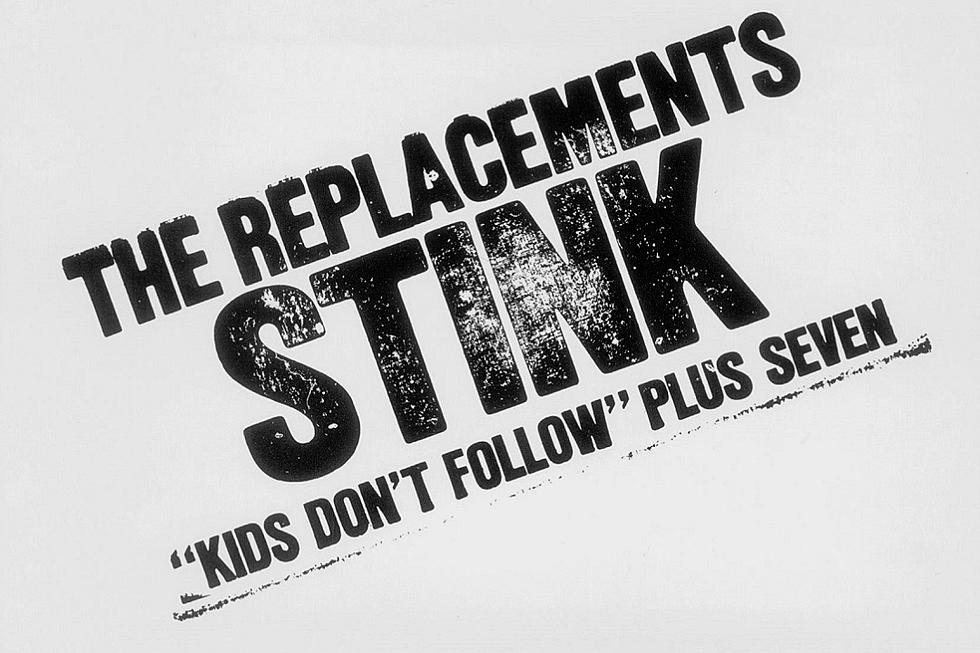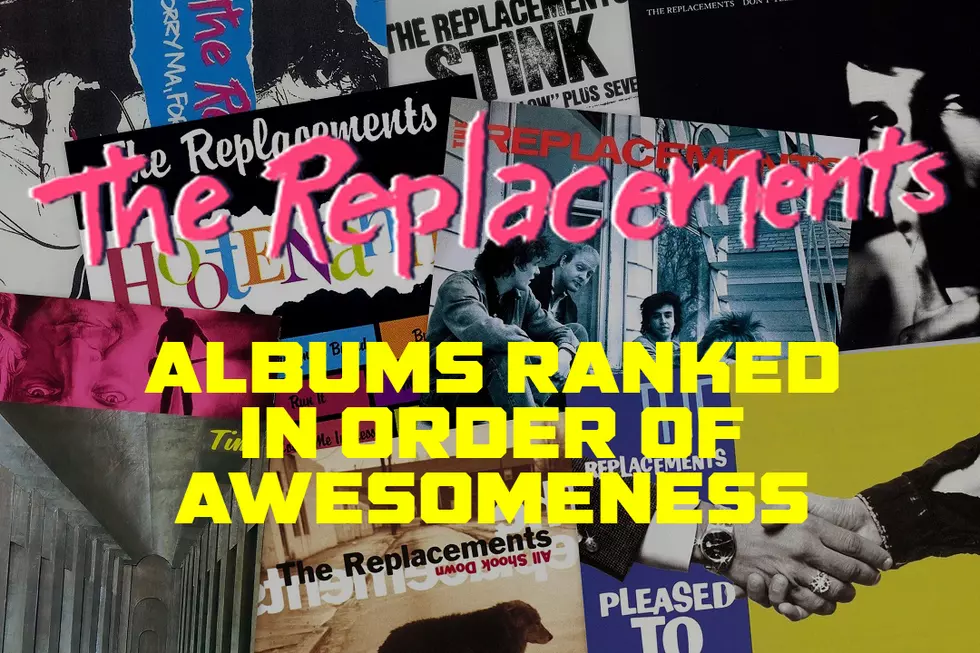In Defense of … the Replacements’ ‘Don’t Tell a Soul’
When Paul Westerberg sang “You know that I’ve made a mistake” on ‘Back to Back,’ hardcore Replacements fans were wishing he was apologizing for his band’s new radio-friendly sound.
In 1989 the Replacements released ‘Don’t Tell a Soul,’ a slickly produced shot at mainstream success that kinda, sorta worked (‘I’ll Be You’ topped Billboard’s Modern Rock chart) and kinda, sorta didn’t (the album failed to become a megahit it could have been in a bizarro universe where people like the Replacements more than Tom Petty).
For every new fan brought on board by the big rock sound of ‘Don’t Tell a Soul,’ there was an already existing ’Mats fan who felt betrayed by the stink of commercialism.
But that’s what punk fans do to punk bands that don’t want to be just “punk bands” anymore. The Replacements started out as a raw, ragged punk outfit that was often too smashed to play anything of consequence at shows. Then they discovered the idea of melody and songs, and they became a more melodic punk outfit that was often too smashed to play songs at their shows.
A whole lot of college students paid five bucks to have this identical story: “Yeah, I saw the Replacements once. They couldn’t play.”
But that touring impotence was (mostly) over by ’88-'89, when the Replacements were a couple of albums deep in the major-label record deal they had landed with Sire. Original guitarist Bob Stinson was no longer part of the band – both because he hated that Westerberg was writing ballads and because he was drunk all the time. (He died from alcohol and drug abuse in 1995.)
In Bob’s place was Slim Dunlap, along with founding bassist Tommy Stinson (Bob’s brother) and drummer Chris Mars.
When the band made the big jump from Twin/Tone to the majors in 1985, many of the faithful were fearful of a gussied-up, big-time debut. Instead, they got the raw, yet well-crafted, explosion of ‘Tim,’ perhaps the best album the Replacements ever made.
With 1987’s ‘Pleased to Meet Me,’ the sound got a little cleaner, but the guitars still had teeth – plus producer Jim Dickinson got a “cool” pass because he’d manned the boards for Big Star.
And then came ‘Don’t Tell a Soul,’ which had been recorded once, but was immediately dismissed by Westerberg for being too raw and too loud (two phrases not in the vocabularies of many Replacements fans at the time).
The band regrouped in Los Angeles with producer Matt Wallace, who would become known for helming released by Faith No More and Maroon 5 (which is either a good thing or a bad thing or both). Any traces of college rock, much less punk, were washed away by gauzy synths and that awful, soulless ’80s drum sound.
I know I’m supposed to be defending this album from those who rank it the worst thing the Replacements ever did. And I’m going to get there, really. But I can’t defend Wallace’s production (or Westerberg’s embrace of it) on ‘Don’t Tell a Soul.’ Have you listened to the swirling sewage at the beginning of ‘We’ll Inherit the Earth,’ with heavily processed cherubs of death whimpering “Inherit the Earth … Inherit the Earth”?
It’s enough to make you skip the whole track because you’re afraid a Belinda Carlisle ballad is going to break out. And what’s that tinkly-winkly sound in the background of ‘I Won’t’? What kind of instrument makes that noise? An electronic glockenspiel set to “ATM Machine”? What kind of idiot …?
I know, I know. Defend. Not attack. Deep breath. That’s right. Defend. Got it.
What elevates ‘Don’t Tell a Soul’ above the sonic sludge is the songwriting. During the Replacements’ run, Westerberg was climbing the ladder from punk frontman to singer-songwriter (yes, you could say he missed the whole first rung on ‘Sorry Ma, Forgot to Take Out the Trash’).
The band’s edge suffered in almost parallel proportion to Westerberg’s songwriting talents – making the Replacements discography kind of like a bell curve in terms of quality.
But ‘Don’t Tell a Soul’ should sit relatively high on that arc because Westerberg’s words were becoming more nuanced, more personal and more interesting. On ‘They’re Blind,’ he turns an excoriation of rock critics into a tragic tale of a relationship gone bad (or maybe it’s the other way around).
‘Asking Me Lies’ finds Westerberg pulling out John Prine-caliber lyrics, the kind that say nothing and mean everything: “The rich are getting richer / The poor are getting drunk / In a black and white picture, there’s a lot of gray bunk.”
‘We’ll Inherit the Earth’ is a smirking sneer at the self-righteous – and would be purposely misused as a Christian rock song in the movie ‘Saved!’ If the sensitive acoustic moment of ‘Rock ’N’ Roll Ghost’ isn’t quite on par with ‘Here Comes a Regular,’ it delves deeper into Westerberg’s weary career feelings and can be interpreted as a preemptive eulogy for his old buddy Bob.
And we haven’t even gotten to the best tracks, starting with the one that actually made an impression on the mainstream, ‘I’ll Be You.’ With its chugging guitar riff and overwrought vocal performance from Westerberg, the song is a big, screaming, capital “R” rock song that never sounds as good as when it is pumping out of a car stereo. That our hero is setting the table for failure on the song that was the Replacements’ biggest success is almost too perfect.
And there’s Paul, in the song’s home stretch, screaming from the back of his throat about “a dream too tired to come true” and begging to switch places with someone else. The legacy of this band is that, even when they were winning, they were losers.
That’s certainly evident in the leadoff track ‘Talent Show,’ which finds the band getting nostalgic for the low stakes, easy drugs and empty seats of its early days. This breezy mid-tempo rocker and ‘I’ll Be You’ bookend the Replacements’ entire run.
They are self portraits of the beginning and the end of the band. The only difference is that Westerberg had just a bit more hope at the start. On ‘Talent Show,’ he mumbles, “We might even win this time, guys, you never know.”
The greatest song on ‘Don’t Tell a Soul’ isn’t so much about losing, but being plain lost. Westerberg wrote this country-rock ballad (complete with twangy guitar) about a girl that anyone who’s ever been to a rock club would recognize. She’s that arty chick who’s a poet one week, an artist the next. She’s passionate and confused, completely incomprehensible and totally alluring.
The language is simple and stunning: “She’s kind of like a movie / Everyone rushes to see / And no one understands it / Sittin’ in their seats.” Until recently, I misheard “Poems come so slowly / Like colors down a sheet” as “Like a colored diamond sheik” (how nice for his harem …). Back to the actual lyrics, Westerberg manages to define the indefinable. “Thought about, not understood / She’s achin’ to be.”
Achin’ to be … what exactly? Creative? Important? Respected? Successful? Loved? Westerberg doesn’t tell a soul. But we know he aches to be with her.
If Replacements fans were achin’ for a return to a looser, harder sound after ‘Don’t Tell a Soul,’ then they’re still waiting. Westerberg ostensibly began his solo career with 1990’s soft and glossy ‘All Shook Down’ (recorded mostly with session dudes, but credited to the band), then struck out on his own for real by singing the power pop theme song to ‘Singles.’
Tommy Stinson became the bassist for latter-day Guns N’ Roses (which is like Ron Asheton joining the Rolling Stones), proving that his greatest talent is taking orders from control freaks.
When Stinson and Westerberg reinvigorated the Replacements as a live act in 2013, they largely ignored ‘Don’t Tell a Soul’ (except for ‘Achin’ to Be’; they added ‘I’ll Be You’ into the 2014 sets). Too bad. If there are any Replacements songs that deserve to be heard in a stripped-down context, it’s the ones on this album.
More From Diffuser.fm









